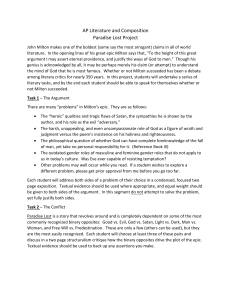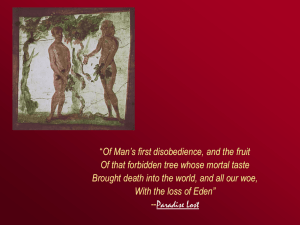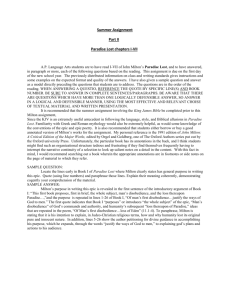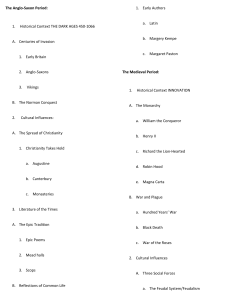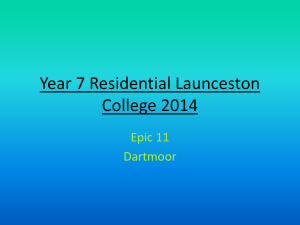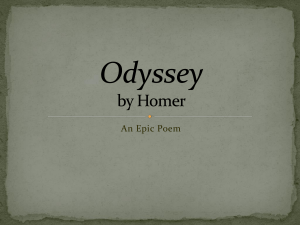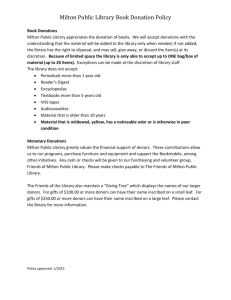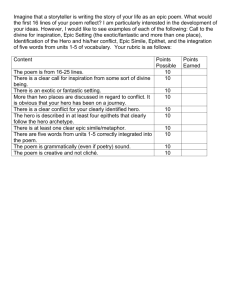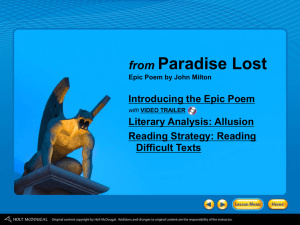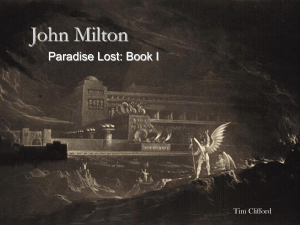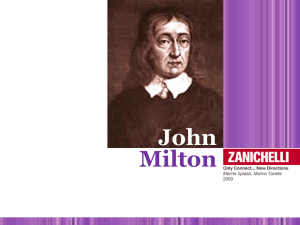Notes on Paradise Lost
advertisement
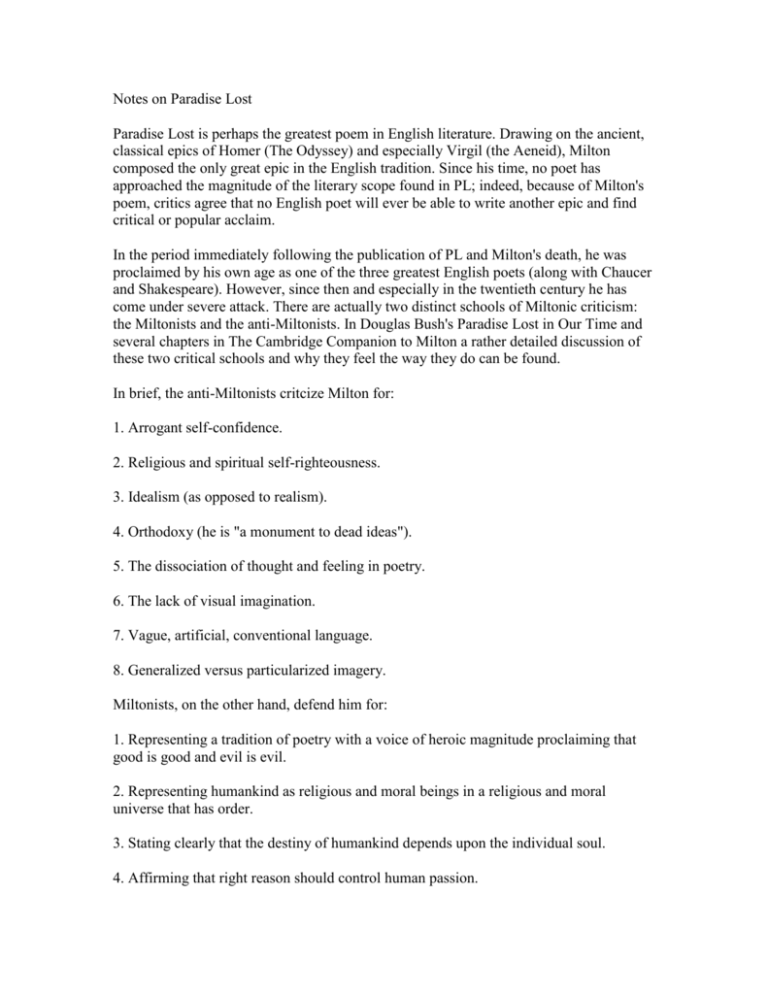
Notes on Paradise Lost Paradise Lost is perhaps the greatest poem in English literature. Drawing on the ancient, classical epics of Homer (The Odyssey) and especially Virgil (the Aeneid), Milton composed the only great epic in the English tradition. Since his time, no poet has approached the magnitude of the literary scope found in PL; indeed, because of Milton's poem, critics agree that no English poet will ever be able to write another epic and find critical or popular acclaim. In the period immediately following the publication of PL and Milton's death, he was proclaimed by his own age as one of the three greatest English poets (along with Chaucer and Shakespeare). However, since then and especially in the twentieth century he has come under severe attack. There are actually two distinct schools of Miltonic criticism: the Miltonists and the anti-Miltonists. In Douglas Bush's Paradise Lost in Our Time and several chapters in The Cambridge Companion to Milton a rather detailed discussion of these two critical schools and why they feel the way they do can be found. In brief, the anti-Miltonists critcize Milton for: 1. Arrogant self-confidence. 2. Religious and spiritual self-righteousness. 3. Idealism (as opposed to realism). 4. Orthodoxy (he is "a monument to dead ideas"). 5. The dissociation of thought and feeling in poetry. 6. The lack of visual imagination. 7. Vague, artificial, conventional language. 8. Generalized versus particularized imagery. Miltonists, on the other hand, defend him for: 1. Representing a tradition of poetry with a voice of heroic magnitude proclaiming that good is good and evil is evil. 2. Representing humankind as religious and moral beings in a religious and moral universe that has order. 3. Stating clearly that the destiny of humankind depends upon the individual soul. 4. Affirming that right reason should control human passion. 5. Composing an epic following the traditions and formulas of Greek and especially Roman models; that is, how can he be criticized for writing a poem that meets the traditional guidelines for a poem? One of the most fervent Miltonists is C. S. Lewis and his Preface to Paradise Lost is a masterful defence of what Milton is trying to do in PL. There are several things you should keep in mind as you approach a reading and study of PL. First, it is essential to recognize that Milton's Christian faith clearly impacts PL. For example, the theme of the poem is "to justify the ways of God to men"; its subject is Christian: God (good) vs. Satan (evil); and its scope is Christian: humankind, though separated from God because of sin, is given the opportunity for redemption through Christ's incarnation, death on the cross, and resurrection. Second, PL is written in a special literary form: the epic. In Lewis' Preface to Paradise Lost, the first eight chapters deal with distinguishing what an epic is and how PL fits the form. To summarize, there are historically two kinds of epics: the primary (The Odyssey and Beowulf) and the secondary (The Aeneid). An epic like Beowulf is characterized by: coming out of an oral tradition; that is; it was originally composed orally and passed down through the generations by word of mouth; additionally, hearing not reading was the only demand on the audience; for this reason, we can refer to the primary epic as a non-literary epic. concerning the story of one man's life and his heroic adventures; though his story may be important as it relates to a nation or state, the central focus is on the individual, not the universal. concerning honor, bravery, adventure, genealogy, and etiquette; they have a "festal, aristocratic, public, ceremonial tone." using stock words, phrases, and even whole lines, already familiar to the audience. PL, on the other hand, is a secondary epic, patterned in many ways after Virgil's Aeneid, and is characterized by: coming out of a written tradition; that is, it was originally composed in written words and intended to be read by the audience; consequently, we refer to a secondary epic as a literary epic; in such an epic much is demanded of the audience because it has the luxury to pick-up and put down the written word at its leisure, and the author can rely on its literary expertise as he composes. having a "grand" style, including the use of unfamiliar words and constructions (the epic simile is one example); splendid, remote, terrible, voluptuous, and celebrated proper names; and constant allusion to all sources that heighten our sensory experience tempered by an overwhelming austerity (light, darkness, storms, flowers, jewels, sexual love, and so on). harkening to the past and a looking forward to the future; creates a sense of timelessness and destiny. concerning not just the adventures of a hero, but revolving around some kind of national, cosmic, or universal question; often the story concerns "the turning of a corner" in history or a transition from one way of seeing the universe to another. using the "stock response" as a way of appealing to readers' sensibilities; a stock response may be defined as humankind's "traditional" response to ideas like love, honor, virtue, bravery, friendship, loyalty, and so. using war as a central part of the action. invoking the Muses. Lewis also cautions us as readers to not judge PL as a modern poem; he says that we must understand the poem in the sense in which Milton wrote it and in accordance with the "rules" a poet should have followed when writing such a poem. He says: "You must, so far as in you lies, become an Achaean chief while reading Homer, a medieval knight while reading Malory, and an eighteenth century Londoner while Johnson. Only thus will you be able to judge the work 'in the same spirit that its author writ' and to avoid chimerical criticism." He puts this in a slightly different way when he says: "The possible [Milton] in myself interests me more than the possible C. S. Lewis in [Milton]. The general structure of PL may be described as follows: Books I-III Satan in hell with his followers Book IV Satan's entry into Paradise Books V-VI The war in heaven Books VII-VIII The story of the creation Book IX The the fall and paradise lost Books X-XII The history of humankind There is a balance between the different sections; that is, Books I-III balance against XXII, IV with IX, and V-VI with VII-VIII. Other smaller structural parallels include the Holy Trinity vs. the Unholy Trinity; Satan's fall vs. Adam's fall; and the fallen angels vs. the loyal angels. One final note. Milton utilizes a Latinate syntax structure for most of PL. In English the typical sentence pattern is SUBJECT:VERB:OBJECT as in: "We (sub.) were forced (verb) to read Paradise Lost (obj.). Milton, both for purposes of style and substance, decided to follow the Latinate syntax of Virgil. In Latin, because it is an inflected language (inflected means that words gain their meaning in a sentence because of the endings assigned them), word order is not important. Thus, Milton writes: To whom th' Arch-Enemy, And thence in Heav'n call'd Satan, with bold words Breaking the horrid silence thus began. (I, 81-83) In normal English we might write instead something like: "Satan, also known in heaven as the arch-enemy, began breaking the horrid silence." Milton's intention is not to be obscure or pompous with this Latinate style, but instead he is attempting to imitate the grand style of the epics he so admired.
